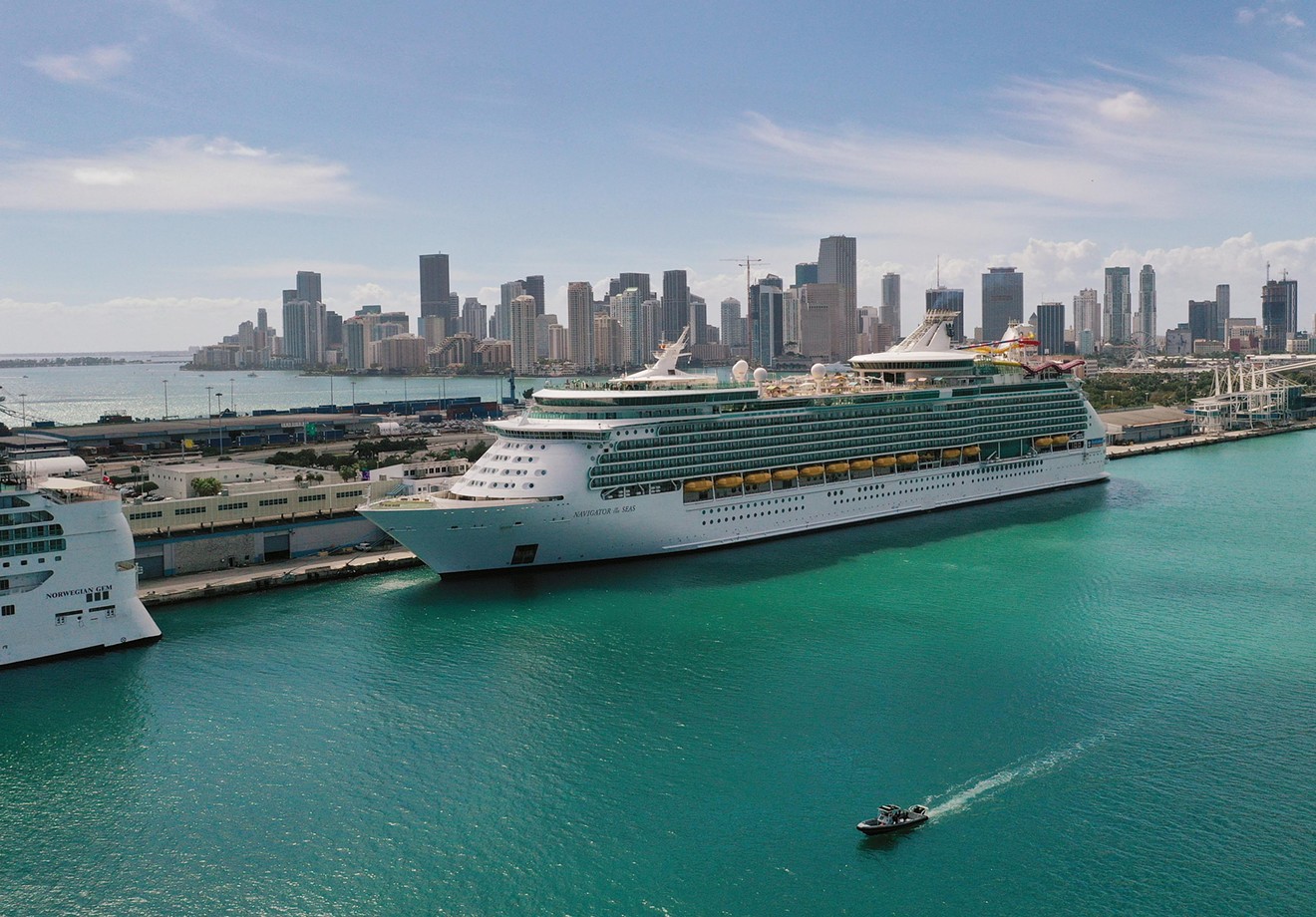After a night of revelry aboard the Margaritaville at Sea Paradise on a three-day trip to Grand Bahama, two friends woke up to find a cruise ship bartender looming in their cabin. When one of the women awoke, she realized the man was "touching her breasts, kissing her neck, and vaginally penetrating her," according to court documents. The other woman claims he sexually assaulted and impregnated her during the May 2023 incident.
Months later, a camp counselor working on Celebrity Cruises' Celebrity Silhouette admitted he had sexually abused multiple children in the ship's Camp at Sea program, according to the FBI. The bureau says the man made the confession shortly after a 6-year-old victim and her parents reported him in November for groping her in the ship's youth center.
The incidents, both of which were first reported by New Times, served as a reminder that the cruise industry is still plagued with sexual assault claims despite years of public scrutiny, waves of litigation, and Congressional hearings on the issue.
Seemingly in an eternal state of damage control, cruise companies have pledged to improve accountability and increase transparency in their crime reporting. The industry's primary trade group, meanwhile, has maintained that sex crimes are no more common on cruise ships than in the average U.S. city – a narrative that has been challenged fiercely by victims' advocates and maritime attorneys.
As the debate plays out and lawsuits continue to pour in, newly released data shows the number of sexual assaults reported on cruise ships rose sharply in 2023, the first year the industry was back in full swing post-pandemic.
A report from the U.S. Department of Transportation (DOT) states that 131 alleged incidents of sexual assault and rape were reported on cruise ships last year – a marked increase beyond the 2022 total of 87 and the pre-pandemic totals of 101 in 2019 and 82 in 2018. The 2023 rate equates to more than ten sexual assault reports submitted per month on average across major cruise companies.
Jim Walker, a Miami-based maritime attorney who has represented dozens of cruise ship assault victims, tells New Times he is not surprised by the new figures. He blames the sexual assault prevalence on lax security, a culture of heavy drinking, and a lack of proper vetting of crew members.
Walker says that onboard sexual assaults are still underreported and underprosecuted because there is no law enforcement agency exclusively devoted to handling crimes on ships at sea – and the cruise lines routinely try to sweep incidents under the rug.
"The FBI is more interested in international terrorism, white-collar crime, and so forth. Long story short, there is very little accountability, so when a crime is committed on a cruise ship, in most instances, there's not going to be a criminal prosecution," says Walker, who has testified several times before Congress on cruise crime and safety.
Reached by New Times about the new statistics, Cruise Lines International Association (CLIA), whose members include the largest cruise companies, maintains that "cruise ships are one of the safest vacation options in the world."
"Cruise lines have a zero-tolerance policy when it comes to criminal behavior, and allegations of major crimes on cruise ships are extremely rare," the group says.
CLIA says that "capacity increases with new ships and a greater volume of passengers" should be taken into account when digesting the new report. The group says that it parsed through the data from January through September 2023 and that the numbers "show only a marginal increase" in crime compared to the same period in 2019.
The highest number of alleged sexual assaults and rapes occurred on Carnival Cruise Line ships, with 45 throughout 2023, according to the DOT report. Thirty-eight of the incidents were allegedly committed by passengers, three by crew members, and four were marked as "unknown or other."
Miami-based Royal Caribbean had the second-highest frequency of reported incidents, with 26. Federal court records show the cruise line has been sued twice in the last eight months over separate cases of alleged sexual assault aboard the Navigator of the Seas ship.
Carnival and Royal Caribbean have the largest market share in the industry by far, ferrying millions of passengers annually around the globe. Their parent firms operate a laundry list of other popular brands (Costa, Princess, and Aida under Carnival Corp.; Celebrity Cruises and Silversea under Royal Caribbean).
Drilling down on the numbers, passenger volume was about six percent higher in 2023 as compared to 2019, whereas the number of reported sexual assaults was 30 percent higher. The discrepancy is starker when comparing 2023 to 2018: there was a nearly 60 percent higher frequency of sexual assault reports in 2023, set against a roughly 10 percent higher passenger volume.
While passenger-on-passenger assaults are the most frequent type, Walker notes that in cases of sexual misconduct at the hands of cruise staff, it's not uncommon for the employee to have gained access to a victim's locked room using a master key or a key pocketed from the victim. That's what transpired in the May 2023 Margaritaville at Sea incident, when the bartender, Hoobesh Dookhy, allegedly entered the victims' room with a key one of them had used to buy alcohol earlier in the night. (Dookhy pleaded guilty in October to abusive sexual contact with one of the women.)
After reviewing the new reports on sexual assaults aboard cruise ships, Ross Klein, a sociology professor and author of several books on the cruise industry, estimated that Carnival Cruise Line's adjusted rate of sexual assault is 42 per 100,0000 passengers.
Walker says that's higher than the sexual assault rate per capita in 27 U.S. states. He says ships' crime rate should be estimated around the standing number of passengers at a given time (as Klein did), not the total number of passengers that pass through cumulatively over the year.
"The media falls into Carnival's trap saying, 'Well, we have 5.5 million people cruising a year, and the [rate of assaults] is small compared to that,'" Walker says. "That's not the way you look at crime statistics at all. This is what the cruise lines were arguing over 12 years ago when they were trying to avoid reporting."
The cruise trade association claims that even when adjusted to a per-capita tally, onboard violent crime rates show that cruising is safer than spending time on the mainland. CLIA says cruise ships have "rates of serious crimes that are exceedingly lower than those on land due to multiple layers of security and the nature of cruising."
"When it comes to safety and security, the cruise industry is heavily regulated both nationally and internationally, and the transparent public reporting of criminal statistics for cruise ships is unprecedented in other sectors of travel and tourism," the group says.
The Cruise Vessel Safety and Security Act (CVSSA), which passed in 2010, requires cruise lines operating out of U.S. ports to report alleged criminal activity to the FBI, including sexual assaults, rapes, homicides, suspicious deaths, missing U.S. nationals, thefts of more than $10,000, kidnappings, assault with bodily injury, and vessel tampering.
Walker argues that although the law was a step forward, the way that cruise ships report crime "is the bare minimum of what has to be reported." He notes the CVSSA report does not specify which incidents involved children, who make up an estimated one-third of sexual assault victims on cruise ships.
The cruise industry is expecting windfall revenue in 2024 after 2023 surpassed pre-pandemic passenger volume seen in 2019, the last year before the COVID-19 outbreak shut down the industry. Royal Caribbean Group said in an October conference call that bookings were "consistently outpacing 2019 levels by a wide margin."
The Southern District of Florida docket shows that at least three lawsuits with sexual misconduct claims have been filed against cruise companies so far this year: two against MSC Cruises and one against Oceania.
Crime
New Report Highlights Spike in Sexual Assault Cases Aboard Cruise Ships
Cruise law expert Jim Walker says cruise liners' crime reporting is "the bare minimum" of what the law mandates.

Royal Caribbean has been sued twice in the last eight months over separate incidents of alleged sexual misconduct aboard Navigator of the Seas, seen here docked in PortMiami.
Photo by Joe Raedle/Getty Images
[
{
"name": "Editor Picks",
"component": "17482312",
"insertPoint": "4",
"requiredCountToDisplay": "1"
},{
"name": "Inline Links",
"component": "18711090",
"insertPoint": "8th",
"startingPoint": 8,
"requiredCountToDisplay": "7",
"maxInsertions": 25
},{
"name": "Air - MediumRectangle - Combo - Inline Content",
"component": "17482310",
"insertPoint": "8th",
"startingPoint": 8,
"requiredCountToDisplay": "7",
"maxInsertions": 25
},{
"name": "Inline Links",
"component": "18711090",
"insertPoint": "8th",
"startingPoint": 12,
"requiredCountToDisplay": "11",
"maxInsertions": 25
},{
"name": "Air - Leaderboard Tower - Combo - Inline Content",
"component": "17482313",
"insertPoint": "8th",
"startingPoint": 12,
"requiredCountToDisplay": "11",
"maxInsertions": 25
}
]








